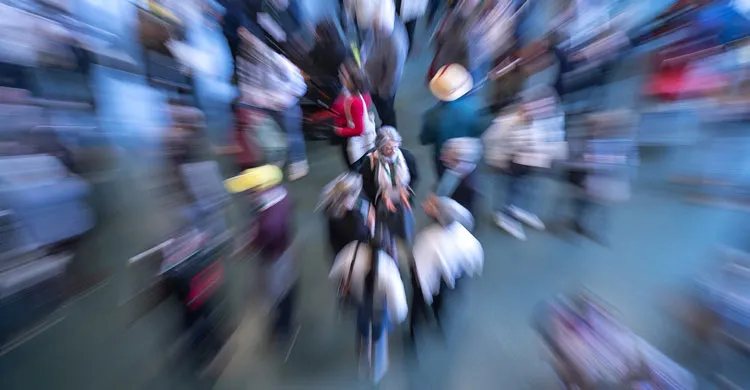1st European Myasthenia Gravis Day: All united to raise awareness of this disease

Characterized by fatigue and muscle weakness that fluctuate over time, autoimmune myasthenia gravis is the subject of the very first European Myasthenia Gravis Day, on 2 June 2023. The aim is to give as many people as possible an understanding of the impact of this unpredictable and often invisible disease, and to standardize the way it is treated across Europe.
Associations in 8 countries, including AFM-Téléthon in France, have joined forces to organize the 1st European Myasthenia Gravis Day on 2 June 2023. "What seems normal to you is a challenge for us" is the slogan for this dedicated day, which sums up the aim of the operation: to raise awareness of the disease and its consequences among the general public, healthcare professionals and institutions, using personal testimonies.
“Simple movements can at times become difficult or even impossible for a myasthenic patient. With this Day, we want to raise awareness of the often invisible but disabling symptoms of the disease. What's more, for some time now research has been making great strides, with new treatments becoming available. Our aim is to raise awareness of the need to standardize medical, social, and psychological care across Europe," explains Annie Archer, head of the AFM-Telethon's Myasthenia Gravis Peer Support Group.
To this end, a delegation of patient representatives will be visiting the European Parliament on 1 June. Appointments have been made with Members of Parliament to raise awareness of the disease, to ensure that it is treated throughout Europe, and to ensure that treatments are available in the same way in all countries.
Up to 100,000 people affected in Europe
A rare disease, myasthenia gravis is thought to affect between 56,000 and 100,000 people in Europe (more than 20,000 in France), and the way it is treated varies from country to country. It is characterized by variable muscle fatigue and weakness in the affected muscles, which fluctuate over time, due to a transmission defect between the nerve and the muscle.
Even when treated, the disease continues to have a major impact on everyday life, according to the preliminary results of the MyRealWorldMG study, which AFM-Téléthon helped to design. In practice, grocery shopping or working proved to be problematic for a third of participants. Muscle fatigue also makes it difficult to perform certain everyday tasks, such as brushing one's teeth or brushing combing one's hair. Similarly, 1/3 of respondents said they suffered from severe anxiety, and between 12% and 53% reported pain, depending on the severity of the myasthenia gravis.
Accelerating research
Knowledge about myasthenia gravis and the search for new treatments continue to advance. Nearly 70 clinical trials are underway or in preparation worldwide, including 10 in France. At the Institute of Myology, the work of Rozen Le Panse's "Myasthenia Gravis: etiology, pathophysiology & therapeutic approach" team, supported by the AFM-Téléthon, is paving the way for tomorrow's clinical trials: it has demonstrated in two mouse models of myasthenia with anti-RAChR that a monoclonal antibody directed against Interleukin-23 (IL-23) has benefits for the thymus and muscles. This initial demonstration paves the way for future clinical trials with one or more anti-IL-23 agents.
The team is also participating in the European MG-PerMed project, which aims to identify reliable biomarkers (genetic, cellular, etc.) that can be used to distinguish between refractory and non-refractory forms of the disease to a specific drug before any treatment is given. The aim is to ensure safer and more effective personalised care, by choosing the treatment that will be most beneficial to a specific patient, according to the specifications of the individual patient and their disease.
Lastly, three biotherapies are available in France and have received early access authorization from the Haute Autorité de Santé [French National Authority for Health]: ravulizumab (Ultomiris®) since May 2022, efgartigimod (Vyvgart®) since July 2022 and zilucoplan since March 2023. Prescribing of these drugs is highly restricted, and for the time being there are criteria limiting access to them.
The AFM-Telethon Myasthenia Gravis Peer Support Group
Do you suffer from myasthenia gravis? Contact the AFM-Telethon Myasthenia Gravis Peer Support Group. You'll be sure to get reliable information and be able to talk to other people about everyday life with the disease. The aim of the Peer Support Group is to help, support and inform patients and their families, but also to contribute to the advancement of knowledge about the disease and life with myasthenia gravis, and to improve care and support for people affected by the disease. In addition, the team represents the needs and expectations of people affected by the disease to the health authorities and, the medical and research communityworld and research.
To find out more, visit the blog of the AFM-Téléthon Myasthenia Gravis Peer Support Group (in French)
More about Myasthenia gravis :
Read Advance in Myasthenia gravis
